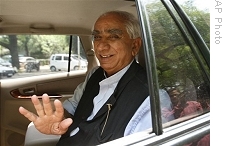New Delhi
27 August 2009
India's opposition Hindu nationalist Bharatiya Janata Party faces a crisis as it grapples with dissension and a challenge to its leadership, following the recent expulsion of a top leader. The divisions in the party reflect an ideological struggle in the right-wing Hindu party, which rose to prominence two decades ago.
The crisis in the opposition BJP has been building ever since it was suffered a crushing defeat in general elections in May, raising questions over why it fared far worse than expected.
 |
| Bharatiya Janata Party, or BJP, leader Jaswant Singh |
Singh says the partition of India into two countries, on religious lines, in 1947 should not be blamed on Jinnah. Many in India believe that - at the time India became independent from British rule - it was Jinnah who insisted that Muslims must have a separate country, resulting in the division of the subcontinent into Hindu majority India and the state of Pakistan.
Jaswant Singh's views reinterpret that traumatic period of history and have angered hardline Hindu leaders, many of whom accuse Jinnah of splitting the country.
Singh's expulsion has triggered a wave of dissent by several key leaders against the present leadership for its lack of tolerance. The strongest attack has come from a former minister, Arun Shourie.
Shourie says the party is like a "kite without a string" and needs to rebuild from the top.
Shourie says someone needs to take charge of the party and that the current leadership is not able to do that.
Many of the dissenting leaders are moderate voices in a party which faces a crisis of identity since it unexpectedly lost power in 2004, after ruling the country for six years.
The BJP had nurtured hopes of recovering lost ground, during this year's general elections. Instead, it saw its share of seats in Parliament dwindle further.
The electoral losses have deepened the rift between those who want the party to head to center ground with a "tolerant" philosophy, and those who want it to return to the more strident Hindu nationalism which made the BJP popular in the 1990's.
The hardliners blame the electoral debacles on the party's drift away from its ultra nationalist Hindu stance. On the other hand, moderate leaders argue that many voters have been alienated by its failure to project itself as a modern party with a pluralistic outlook. Calls by some leaders for an amicable sorting out of differences have been ignored.
Independent political analyst Mahesh Rangarajan says the churning in the BJP shows that the hardliners within the party are gaining supremacy. He says the BJP's ideological parent -- the National Volunteer Corps -- is tightening its grip on the party.
"The expulsion of Jaswant Singh is quite a clear signal that the party is returning to its roots," Rangarajan said. "And, we can probably brace ourselves for a more exclusive kind of party from the one that we got used to?It probably means less space for dissent."
This is exactly what the party president, Rajnath Singh, has signaled. He says the party's ideology is non-negotiable and that the BJP remains committed to what he calls "cultural nationalism". He is shrugging away the attack on the present leadership.
BJP President Rajnath Singh advises people to "wait and watch." He says the BJP will emerge stronger and will fare well in upcoming elections in two states.
Some others are not so sure. Political analyst Rangarajan says the party does remain strong in some regions of the country. But it appears to have failed to take the right message from its electoral defeat - that many Indian voters are rejecting religious fundamentalism and want to focus on building a modern country focused on economic growth.
"Among the middle classes, the sense is that the party is slightly out of touch with the way India is today evolving," Rangarajan said. "They [BJP] are struggling for a voice and struggling for striking the right note at the all-India level. As a central, cohesive party, it is going through a period of what may turn out to be extended turmoil."
Political analysts say the current crisis will hurt the image of the BJP as a credible opposition, which had been seen as a strong contender for power at the national level.